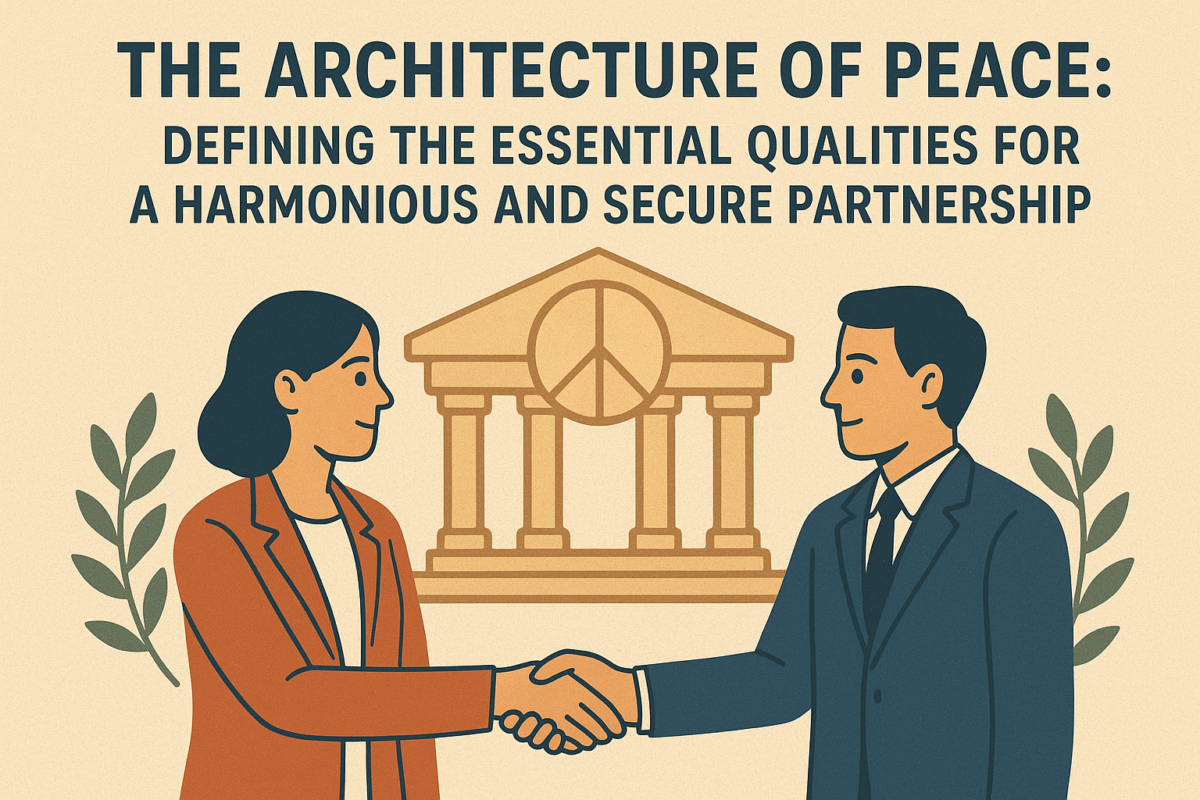The decision of who to share your life with is the most significant financial and emotional investments you will ever make. Marriage, or any long-term partnership, is not simply a romantic union; it is the establishment of a joint venture—an economic, logistical, and emotional entity built to withstand the inevitable pressures of time, career changes, and unforeseen crises.
Therefore, when seeking a life partner, the focus must shift beyond mere attraction to the foundational qualities that dictate the long-term viability, peace, and security of the shared life you intend to build. For a truly peaceful and prosperous existence, two core qualities—emotional resilience and financial prudence—become non-negotiable standards.
1. The Imperative of Emotional Resilience: Avoiding Stress Amplifiers
A peaceful life requires a partner who acts as a source of stability, not a persistent source of friction. The world outside the home provides ample stress; your home should be your sanctuary and your partner, your reliable ballast.
The Problem: The Habit of Stress Amplification
The chronic tendency to become disproportionately stressed over minor issues—a missed turn, a delayed package, a small domestic inconvenience—is a habit that systematically erodes the peace of any household. This is not about compassion for genuine hardship; it is about the lack of emotional regulation when faced with the normal, low-stakes friction of daily life.When a partner consistently treats small irritations as full-blown crises, the following corrosive effects take hold:
Atmospheric Tension: The emotional climate of the home becomes volatile and unpredictable. You lose the ability to relax and recharge because you are constantly waiting for the next “crisis” to erupt, making the home a place of high alert rather than refuge.
The Fatigue of Emotional Labor: You become an unintentional therapist or a constant conflict mediator. Dealing with frequent, minor dramas is mentally and emotionally exhausting, draining your own energy reserves and making you less equipped to handle your own professional and personal challenges.
Skewed Perspective: A person who stresses over a late meal will likely be overwhelmed by a major event, like a health scare or a job loss. This lack of perspective indicates a deeper difficulty in prioritizing and compartmentalizing life’s actual difficulties.
The Quality to Seek: Calm Competence
The quality you must seek is calm competence—a partner who approaches problems with a steady, solution-oriented mindset.
Look for someone who:
Practices Non-Reactive Communication: When something goes wrong, their first response is to assess and act, not to spiral into blame or panic.
Maintains Perspective: They differentiate between a setback (like a broken appliance) and a disaster (like a fire). Their emotional response matches the scale of the problem.
Is a Source of Rest: You should feel more peaceful and centered after spending time with them, not more drained or agitated.This emotional resilience is the bedrock of a tranquil home, allowing both partners to face life’s major challenges as a unified, stable front, rather than fracturing over every bump in the road.
2. The Mandate of Financial Prudence: Avoiding Wealth Destroyers
The second pillar of a secure and peaceful life is a shared commitment to financial discipline. Money problems are not merely transactional; they are fundamental threats to a couple’s future, dreams, and trust. A life of financial peace demands a partner who views money as a tool for future security and stability, not a resource for immediate gratification and status.
The Problem: The Habit of Aggressive Spending
A partner who frequently and aggressively spends money—particularly on unnecessary status symbols, luxury items, or experiences that require going into debt—is a wealth destroyer. This habit makes a high income virtually meaningless, as it prevents the accumulation of the savings and investments that constitute true security.The pitfalls of pairing with an aggressive spender are severe:
The Insecurity Trap: Regardless of how much you earn, a high-spending lifestyle means you are always starting over. Your entire income is claimed by fixed, high expenses, meaning you lack an emergency fund and are one paycheck away from crisis. This is the definition of financial insecurity.
The Debt Engine: Aggressive spending often necessitates debt—credit card balances, larger car loans, or a massive mortgage. This debt acts as an anchor on your future, diverting money that could be building wealth toward servicing past consumption.
Loss of Freedom and Options: A high burn rate eliminates your choices. You lose the financial freedom to pursue passion projects, take time off for family, or retire early. You are chained to your high-paying job simply to maintain the high monthly expenses established by your partner’s spending habits.
Erosion of Trust: Financial discipline requires honesty and teamwork. When one partner is secretly or compulsively spending, it breaks the financial trust that underpins the marriage, leading to bitterness and resentment that is nearly impossible to repair.
The Quality to Seek: Shared Financial VisionThe quality you must seek is financial prudence—a partner who understands that the primary goal of money is to buy future freedom, not present possessions. Look for someone who:
Understands Delayed Gratification: They value long-term stability and wealth creation (savings, investing) over short-term pleasure (shopping). * Has Alignment on the Budget: You should agree on the fundamental purpose of your money—are you accumulating wealth or maximizing consumption?
Favors Low Fixed Costs: They recognize that keeping core expenses (housing, transportation) purposefully low is the fastest way to build the “gap” that provides security and financial flexibility.
Choosing for Longevity
A long-term partnership is an ecosystem. The habits of one individual directly impact the tranquility and security of the other.
To build a peaceful life, you must select a partner who will be your strongest co-architect: someone who brings emotional resilience to withstand the small, everyday tremors of life, and financial prudence to ensure the walls of your financial house remain strong against any major storm. These qualities are the true predictors of a lasting, low-stress, and successful joint life.
